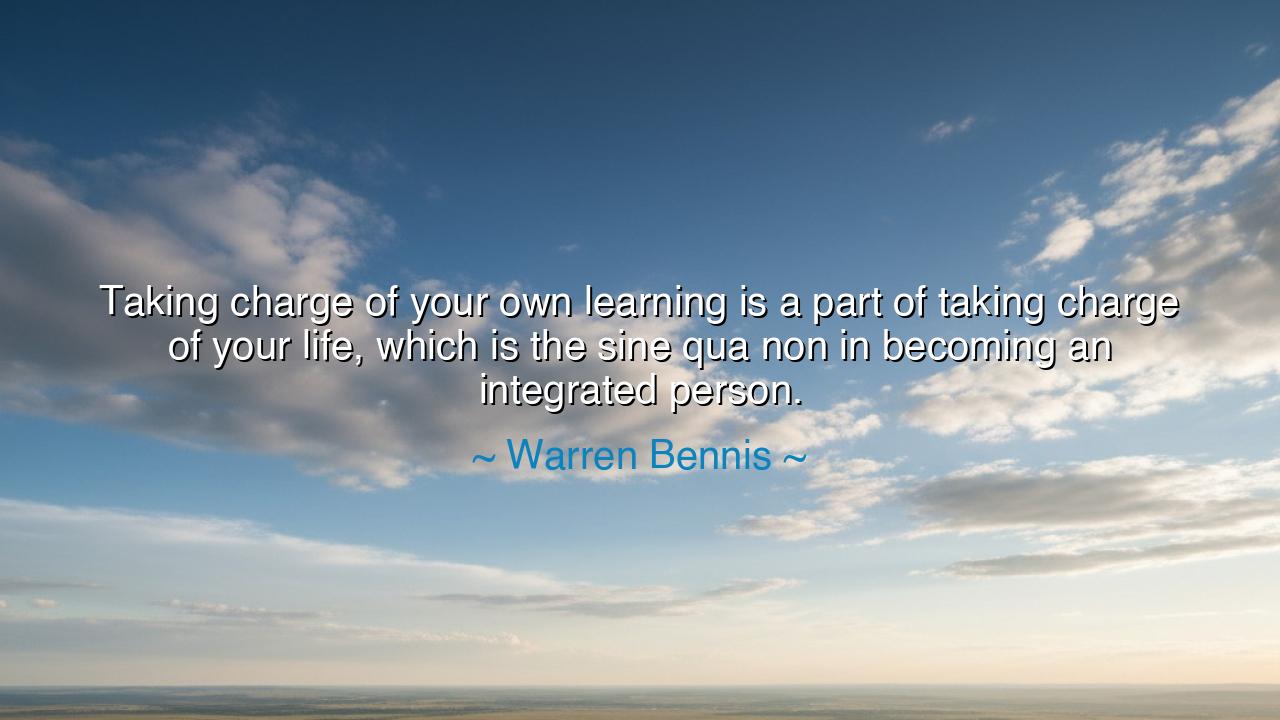
Taking charge of your own learning is a part of taking charge of
Taking charge of your own learning is a part of taking charge of your life, which is the sine qua non in becoming an integrated person.






When Warren Bennis said, “Taking charge of your own learning is a part of taking charge of your life, which is the sine qua non in becoming an integrated person,” he was speaking as a sage of leadership, not merely as a scholar. These words come from a man who spent his life studying how leaders are made — and how greatness is never something bestowed, but something built from within. Bennis believed that self-leadership precedes all other forms of mastery. To learn by one’s own will, to seek knowledge not because it is demanded but because it is desired, is the first act of freedom. For in learning, we do not just shape the mind — we shape the self.
In the ancient sense, his words echo the timeless principle of self-discipline and self-awareness — the twin pillars of wisdom. To “take charge of your own learning” is to awaken the inner fire that drives growth, rather than waiting for others to light it. The philosophers of old — Plato, Confucius, and Epictetus — all taught that a person who depends on external teachers alone will never reach the fullness of understanding. True learning is an act of independence, a rebellion against ignorance and complacency. It is the forging of one’s character in the furnace of curiosity. Bennis calls this process the sine qua non, the indispensable condition, for becoming an integrated person — that is, someone whose thoughts, values, and actions are united in harmony.
Throughout history, those who have changed the world have been self-taught in spirit, even if not in circumstance. Leonardo da Vinci, though apprenticed in art, was his own master in science, anatomy, and engineering. He learned not from obligation but from wonder. His notebooks, filled with sketches and secrets, testify to a mind in love with discovery. So too with Abraham Lincoln, who rose from the frontier cabin to the presidency by reading under candlelight after long days of labor. Neither man was handed knowledge; both claimed it through effort, shaping their own education as they shaped their destiny. Bennis’s wisdom lives in such examples — that learning is not a duty but a declaration of one’s will to grow.
But what does it mean to be an integrated person? It means to live in alignment — for the mind, heart, and hands to act as one. When a person learns only for external reward, their knowledge remains fragmented. But when they learn to understand, to improve, and to serve, their learning fuses with their being. Such a person cannot be swayed by vanity or fear, because they live from a foundation of purpose. Bennis, who guided leaders across generations, knew that this inner unity is the source of real power — not dominance over others, but mastery over oneself. It is what turns learning into wisdom and ambition into vision.
In his teaching, Bennis often contrasted managers and leaders: managers react, but leaders reflect. The leader is one who continues to learn — not because life demands it, but because the soul does. To take charge of one’s learning is to become a lifelong student of experience. The ancients would have called this “walking the Way” — the path of continuous refinement. Just as a river deepens its bed by flowing, so too does the mind deepen by questioning, reading, observing, and acting. A life without self-directed learning is a life that drifts; a life with it becomes a current that shapes its own course.
We can see this truth reflected in the story of Nelson Mandela. During his long imprisonment, he could have surrendered to despair, but instead, he used his solitude as a school. He read, wrote, studied law, and examined his own heart. Through this inner discipline, he transformed from prisoner to statesman, from victim to visionary. He took charge of his learning and, in doing so, took charge of his life — emerging not broken, but integrated, whole, and wise. Such is the living example of Bennis’s teaching: that leadership begins the moment a person assumes responsibility for their own growth.
So, what lesson can we draw from these words of Bennis? It is this: Do not wait to be taught — seek to learn. The classroom is only one doorway; the world is a thousand others. Read widely, reflect deeply, ask questions fearlessly, and learn from every encounter. Make curiosity your compass and discipline your companion. For to learn is to live twice — once in the moment and again in the understanding of it. The person who governs their own education governs their destiny.
Therefore, remember this truth, and carry it as one of life’s sacred rules: the self-directed learner is the self-directed soul. Take charge of your learning, and you take charge of your life. Make of your mind a kingdom, where wisdom reigns and ignorance has no throne. For only in this way — as Bennis taught — can one become not just learned, but whole; not just informed, but integrated, in body, mind, and spirit — a true human being, awake and complete.






AAdministratorAdministrator
Welcome, honored guests. Please leave a comment, we will respond soon